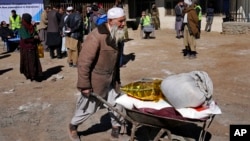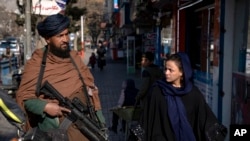The United States said Monday that it had urged Afghanistan's Taliban in the latest round of bilateral talks to reverse policies responsible for the deteriorating human rights situation in the country, particularly for women, girls and vulnerable communities, while praising economic and counternarcotics gains the country has made under the de facto rulers.
The two-day discussions between the former battlefield adversaries occurred in Doha, Qatar, with U.S. special Afghan representative Tom West and Taliban Foreign Minister Amir Khan Muttaqi leading their respective delegations.
The United States "expressed grave concern regarding detentions, media crackdowns and limits on religious practice" since the Taliban seized power in Kabul, said a post-meeting U.S. statement. The U.S. side backed the Afghan people's demands for their rights to be respected and for their voices to shape the future of Afghanistan.
The statement said, without elaborating, that the U.S. side "identified areas for confidence building in support of the Afghan people."
The American delegation also met with leaders from Afghanistan’s central bank, known as Da Afghanistan Bank, or DAB, and finance ministry representatives to discuss the state of the economy and the challenges facing the country's banking sector.
The U.S. officials noted "recent data indicating declining inflation, growth of merchandise exports and imports in Afghanistan in 2023, and voiced openness to a technical dialogue regarding economic stabilization issues soon."
Taliban efforts to fulfill security commitments also figured in the discussions, with the U.S. side noting the de facto Afghan leaders' "continuing commitment" to prevent the use of Afghan territory by anyone to threaten the United States and its allies.
"The American delegation acknowledged that there has been a decrease in large-scale terrorist attacks against Afghan civilians," the statement said. U.S. officials pressed Taliban delegates for the immediate and unconditional release of detained American citizens, warning that the detentions were a "significant obstacle to positive engagement."
The U.S. officials voiced "openness" to continue dialogue with the Taliban on counternarcotics and "took note of reporting indicating that the Taliban's ban on opium poppy cultivation resulted in a significant decrease in cultivation during the most recent growing season."
Earlier, the Taliban-led Afghan foreign ministry, in a statement, said that Muttaqi and his team had stressed the need for Washington to remove travel restrictions on Taliban leaders, end economic sanctions against the strife-torn country and unfreeze Afghan central bank foreign funds. It added that human rights issues also came under discussion.
"IEA reiterated that it was crucial for confidence building that blacklists and reward lists be removed and [the central bank] reserves be unfrozen so that Afghans can establish an economy unreliant on foreign aid," the English-language Taliban statement asserted.
The Taliban calls its male-only government in Kabul the Islamic Emirate of Afghanistan, or IEA. The group waged a deadly insurgency for almost 20 years against U.S.-led NATO troops and the now-defunct Afghan government before seizing power in August 2021.
Bounties on dozen-plus
More than a dozen key Taliban leaders remain on a U.S. list of most-wanted men and carry millions of dollars of bounties on their heads for their roles in directing attacks against American troops.
The U.S. and other Western nations collectively froze more than $9 billion in Afghan central bank foreign reserves immediately after the Taliban takeover to block their access to the funds. They also imposed financial and banking sector sanctions on the country.
Washington has since transferred half of the $7 billion in frozen resources held in the U.S. to a trust fund in Switzerland to be used strictly for Afghan humanitarian efforts.
The Taliban have rejected the fund, demanding the entire amount be returned to the DAB. The U.S. has since eased some of the banking sector curbs to support humanitarian operations in war-ravaged Afghanistan and enable private citizens to receive salaries to support their families.
"Removal of most of the restrictions on Afghan banks leading to easy transactions was considered a positive development," the Taliban statement said Monday.
The fundamentalist leaders have imposed their strict interpretation of Islamic law, or Sharia, to govern impoverished Afghanistan, banning women and girls from education beyond about a sixth-grade level. They have barred women from most employment and visiting public places such as parks, gyms and bathhouses.
The U.N. and other aid agencies also have been banned from hiring female Afghan staff, undermining humanitarian operations in a country where more than 28 million people need food aid.
No foreign government has recognized the Taliban administration over human rights concerns.
Washington and the world have denounced restrictions on Afghan women, demanding the Taliban reverse them if they want their government to be formally recognized and sanctions be lifted.





